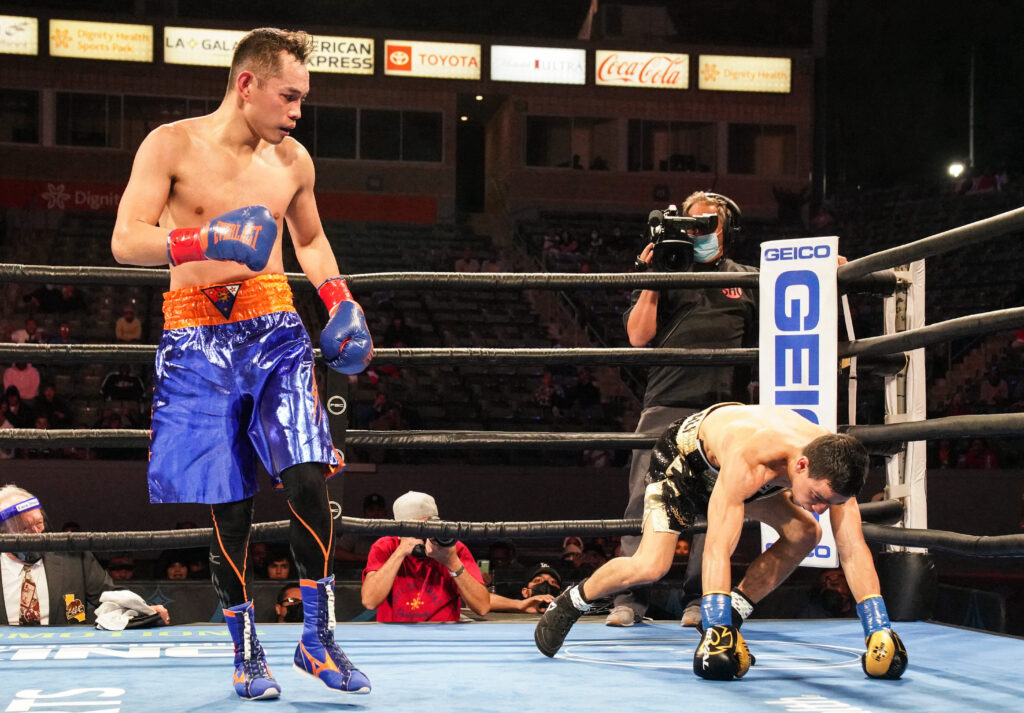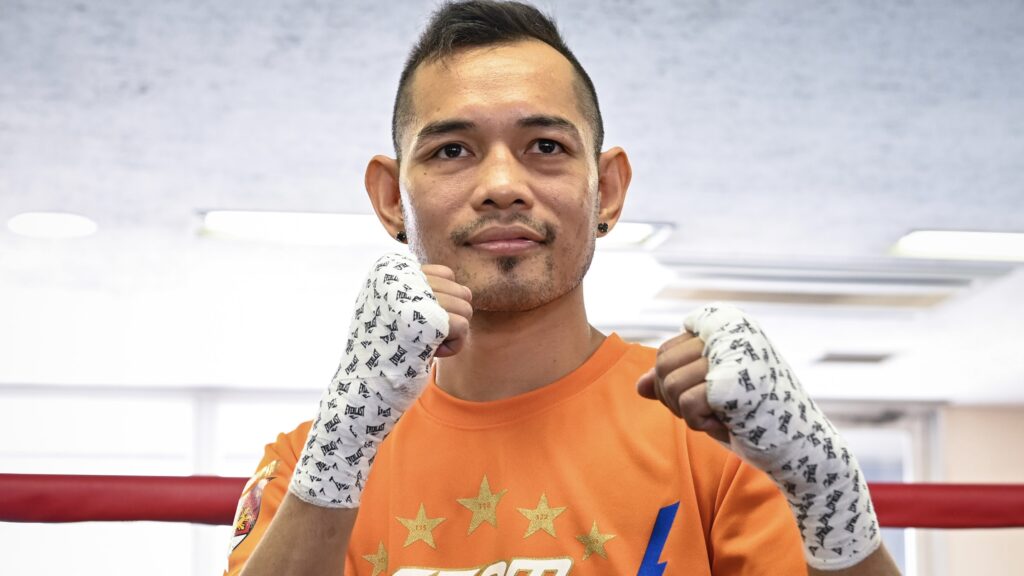There are very few trailblazers who set out to change the game. Breaking new ground is a consequence, not a goal, and for those who only see the world through their own unique lens sitting back and conforming to expectation and stereotype simply isn’t in their DNA. Rachel Donaire, head trainer and wife to the new WBC bantamweight champion, Nonito, is one of these people.
“I want women to be on this huge stage,” she tells Boxing Social.
“It totally needs to be revamped. Highlighting women in boxing, that needs to be changed. Fighting is universal. It’s not just a male sport. Fortunately, UFC or MMA has put a lot of the women fighters at the front. It’s given a little bit more light into women’s boxing because of their crossover into the mainstream media. We can do that, we just need to put the energy into putting these promotions together, to put them on a stage to be seen. I think a lot of it has to do with telling people what you think, honestly. If you never speak up then no one’s gonna hear you. The biggest play is I was never afraid to ask.”
Nonito Donaire’s fourth round demolition of Nordine Oubaali on May 29th created a unique piece of history for this revered boxing partnership. For the fighter himself a new crown was added to an already gleaming legacy, with the future Hall Of Famer and four-division conqueror becoming a bantamweight champion for the third time at 38 years of age. The accomplishment also placed Rachel in a unique and unprecedented position as she became the first ever female head trainer to coach a world champion.
“The phone did not stop ringing for quite some time. We didn’t sleep for 48 hours after the fight. It was funny because I’d pick up the phone and be like, ‘Oh, you want to speak to Nonito?’ And they were like, “No, actually I want to talk to you.’ ‘Oh OK! Alright!’ It’s just not something I’m used to. Interviews have been coming in left and right.”
With the nature of Nonito’s performance impressing so many such interest needn’t have come as a surprise, particularly when the synergy at play in the corner was so evident. Team Donaire looked like a partnership entirely in control from the opening bell, with Rachel having studied their opponent scrupulously in the build-up and Nonito responding to her analysis in his strategizing.
“I looked at training tapes that he’s put up on YouTube and I saw his (Oubaali’s) consistencies and tendencies when he throws, how much he jumps in with the jab. How do you know he’s gonna throw a combination and not just the jab? Which way does he bend? Those kind of things especially when you’re fighting a fighter like him, it’s ingrained. He’s been in the amateurs for so long, he knows one way of fighting. That isn’t to say he can’t adapt but there are things that are ingrained in the way your foundation is that’s going to be difficult to change based on the fighter that you’re fighting.”

A week passed by and when the dust finally settled on their triumph Rachel took to social media to open up about the difficulties she’s had to overcome within the boxing business over the past 13 years. From falling in love with her husband to becoming his manager and finally his head coach, the journey has been a painful and turbulent one, with bullies, sceptics and naysayers all eager to deny a candid young woman her place at boxing’s patriarchal business table. The cost to her mental health has been significant.
“I really did try to get away from it. Everything I did as far as management was just because of him (Nonito). I didn’t come in looking for a fighter to manage. It was a co-management between myself and Cameron Duncan for some time and he saw that I would look at contracts and I would red line them. I would argue for more things for the fighter. And I would go head-to-head with these promoters, some of them not abiding by their contracts. And any time that I did point it out I got called a ‘tart’ or a ‘b**ch’.
“Just consistent downplaying. Instead of it just being, ‘this is a business.’ Why does it have to be like this? I’ve always notice that, in any business space I’ve ever been in. Instead of, ‘She’s being determined, this is how business is supposed to be run’ they would use different adjectives for a woman that’s trying to take charge. But then these men who’re managers never got that. You didn’t hear them say ‘he dresses like an old man, he’s way above his pay grade, he’s an asshole.’ You never hear that. There’s never this downplay. I had to bite my tongue a lot.”
Alongside trying to navigate her way through this sea of myopic svengali characters was the online abuse she received. As her own career developed in tandem with Nonito’s the criticism worsened, and the impact took its toll. Public engagements soon became increasingly difficult, with Rachel having to manage feelings of intense panic within the confines of hectic arenas and bustling press conferences.
“When I got with Nonito his parents were against me for quite some time. So I got that kind of verbal abuse throughout the media as well. And for us we were just like ‘We’re happy, just leave us alone. Stop. Just block it all out because this is not the world that we want to live in.’ I remember then I was younger and I was super fiery. And if any of these reporters would say anything I would just mouth back. I made a lot of enemies in media when I would mouth off because they felt like they should have a say in our personal life. Even when what they’re reporting is actually creating a larger gap in our family than mending it” said Donaire.
“I never liked looking into the comments because of that. Just do the interview and don’t look at the comments. In addition to that, one of the things besides the bullying is that I’ve always been claustrophobic. So a lot of the times when all of this was coming to be and I was thrown into the spotlight with Nonito we’d go to a fight and there’d be crowds. People would notice that I would kind of walk away.

“Nonito would be signing autographs and taking pictures and I would just kind of walk ahead of them. And you would hear things like ‘she walked away/ she’s being a b**ch again.’ That same word over and over again. And it was never that for me, it was really just that I needed to put myself in a different space because I’m claustrophobic. I just need air. And when there’s a bunch of people surrounding me and taking that oxygen, I just need to get out for a second. But most people don’t see mental health as a thing. And it really is. I have to put myself into a space to be at those events. You can’t just toss me into an event without me being prepared.”
Despite all of these personal struggles Rachel continued to successfully oversee Nonito’s illustrious career, and as her knowledge and experience grew so too did her role within the Filipino Flash’s fight camp. Reflecting upon the root of her resilience, she points to her background in taekwondo as the spark which lit her tenacious spirit. This wasn’t just a dalliance into combat sports, Donaire made it onto the USA National Collegiate Team, the US National Team and the Philippine National Team, and became a military taekwondo champion after joining the US Air Force.
“I was in taekwondo from the age of 8, started competing pretty much from 9. Since the beginning whenever I stepped into the ring I was almost always the smallest one. And it was always like, ‘Oh you’re fighting her? Oh she’s nothing. She’s tiny.’ And it always made me want to fight and prove them wrong and to give pride to my parents cos they were spending money to send me to these competitions. There wasn’t going to be an excuse for me not to win. The thing with it is it’s so right here, it’s just one-on-one. And then it doesn’t go anywhere else. So I think that’s where I started just tuning out. To create the world that I want to live in, especially for our boys. That positivity.”
As a trainer this background in martial arts has been key to the work Rachel has implemented within Nonito’s camps. With a world title won, making him the oldest fighter ever to become a bantamweight world champion, her own stock has risen exponentially. For Rachel, however, it also points to a larger issue, namely how the methodology behind training a fighter needs to modernise and how embracing new ideas can advance the fine-tuning required.
“One of the conversations I’ve had recently they were asking, ‘How in the world did I even start strength training Nonito?’ We were both competing at the same time. I was competing for regionals at the time and we’re cutting weight. So he said ‘OK, let’s go for a 10 mile run. And I said, ‘I don’t run 10 miles.’ And he was like, ‘Why?!’ I said, ‘Because I don’t jog in one direction when I fight. There’s lateral movement, there’s backward movement, you’re not jogging. It’s really more of a sprint.
“Ours were 3 rounds for 3 minutes. His were, of course, 12 rounds for 3 minutes. But it’s this conditioning of ‘old school knows best.’ Now, old school has a lot of great knowledge when it comes to verbalising what needs to happen in the ring and game plan strategy. But the training methods are not the same. You don’t run a fighter until they’re dying and leave it all in the gym.
“Rest and recovery is important, circuiting the exercises is important. The team needs to work together. A male strength trainer and a male head coach? The head coach is gonna push his fighter in the gym and then, what, two hours later the strength and conditioning coach wants to kill him? The view of how boxing is needs to change and the view of these fighters are treated needs to change.”
The infectious nature of success in boxing has inevitably created a buzz around the Donaires, with fighters gravitating towards them both to see if some of their magic might rub off on them. So will this recent recognition lead to a stable of Rachel Donaire fighters? The trainer herself gushes at the prospect but remains understandably cautious.
“I’ve had a handful that want me to train them. It’s something that me and my husband have to talk about. I love training fighters. It’s something I’ve always loved doing. If I’m not teaching, that’s my fire and passion. I told him (Nonito) one of the most exciting parts of my life was strength and conditioning training him for the Inoue fight, and then I was teaching at the gym. That was when I had so much fun, that was when I felt I was giving something and I was getting something in return. The energy from these people that showed up to these classes. It is a passion of mine. I love doing it. If it was completely my choice I would go into it head on. But this is a team.”
